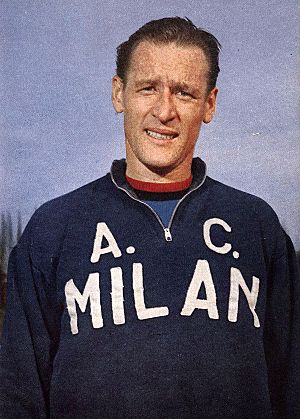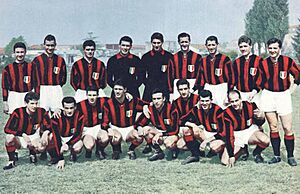Nils Liedholm facts for kids

Liedholm with Milan 1959
|
||||||||||||||||||||||
| Personal information | ||||||||||||||||||||||
|---|---|---|---|---|---|---|---|---|---|---|---|---|---|---|---|---|---|---|---|---|---|---|
| Full name | Nils Erik Liedholm | |||||||||||||||||||||
| Date of birth | 8 October 1922 | |||||||||||||||||||||
| Place of birth | Valdemarsvik, Sweden | |||||||||||||||||||||
| Date of death | 5 November 2007 (aged 85) | |||||||||||||||||||||
| Place of death | Cuccaro Monferrato, Italy | |||||||||||||||||||||
| Height | 1.83 m (6 ft 0 in) | |||||||||||||||||||||
| Position(s) | Attacking midfielder | |||||||||||||||||||||
| Senior career* | ||||||||||||||||||||||
| Years | Team | Apps | (Gls) | |||||||||||||||||||
| 1938–1943 | Valdemarsviks IF | |||||||||||||||||||||
| 1943–1946 | IK Sleipner | 60 | (24) | |||||||||||||||||||
| 1946–1949 | IFK Norrköping | 48 | (22) | |||||||||||||||||||
| 1949–1961 | Milan | 359 | (81) | |||||||||||||||||||
| International career | ||||||||||||||||||||||
| 1947–1958 | Sweden | 23 | (12) | |||||||||||||||||||
| Managerial career | ||||||||||||||||||||||
| 1961–1963 | Milan (assistant coach) | |||||||||||||||||||||
| 1963–1966 | Milan | |||||||||||||||||||||
| 1966–1968 | Verona | |||||||||||||||||||||
| 1968–1969 | Monza | |||||||||||||||||||||
| 1969–1971 | Varese | |||||||||||||||||||||
| 1971–1973 | Fiorentina | |||||||||||||||||||||
| 1973–1977 | Roma | |||||||||||||||||||||
| 1977–1979 | Milan | |||||||||||||||||||||
| 1979–1984 | Roma | |||||||||||||||||||||
| 1984–1987 | Milan | |||||||||||||||||||||
| 1987–1989 | Roma | |||||||||||||||||||||
| 1992 | Verona | |||||||||||||||||||||
| 1996 | Roma | |||||||||||||||||||||
|
Medal record
|
||||||||||||||||||||||
| *Club domestic league appearances and goals | ||||||||||||||||||||||
Nils Erik Liedholm (born October 8, 1922 – died November 5, 2007) was a famous Swedish football player and coach. In Italy, people lovingly called him Il Barone, which means "The Baron." He was known for being part of a super trio of players called "Gre-No-Li" with Gunnar Gren and Gunnar Nordahl. They played together for A.C. Milan and the Swedish national team. Nils Liedholm had a very successful career with both teams.
Liedholm was a smart and very skilled midfielder. He was known for his amazing passes and elegant way of playing. Many people think he is one of the greatest players ever for Milan and Sweden. He is also seen as one of the best players from after World War II. At the end of the 1900s, readers of Sweden's biggest newspaper, Aftonbladet, voted him the best Swedish player of the last 1,000 years!
After he stopped playing, Liedholm became a coach. He managed many teams in Italy for almost 40 years. He was famous for using a special defense system called zonal marking. He is considered one of the most successful coaches in Italian football history.
Contents
Nils Liedholm: A Football Legend
Playing for Clubs
Nils Liedholm started his football journey in 1938 with his first club, Valdemarsviks IF. In 1942, he moved to IK Sleipner. Then, in 1946, he joined a bigger Swedish club, IFK Norrköping. With Norrköping, he helped them win two Swedish league titles. During this time, he also played 18 games for the Swedish national team. He even won a gold medal at the 1948 Summer Olympics.
This success led him to join Milan in Italy in 1949. He played his first game in Italy on September 11, 1949. In his first season with Milan, he played 37 games and scored 18 goals. In 1951, Liedholm won his first of four scudetto titles (the Italian league championship). He won three more titles in 1955, 1957, and 1959.
Liedholm was a key player for Milan during one of their best periods. He also won the Latin Cup twice, in 1951 and 1956. He was the captain of Milan in the 1958 European Cup Final against Real Madrid. Milan lost that game 3–2 after extra time. It's said that even after winning, Real Madrid's great player Alfredo Di Stefano felt Milan could have won.
Nils Liedholm was famous for his amazing passing skills and understanding of the game. He created many goals for his teammate Gunnar Nordahl. There's a famous story that it took him two years playing for Milan before he made his first bad pass at their home stadium, the San Siro. When it happened, the home crowd gave him a five-minute round of applause because it was so rare!
Liedholm also understood how important fitness was for playing well. He trained much more than other players. He would do sprints, long-distance runs, javelin throws, shot put, and high jump twice a week. He kept playing club football until he was almost 40 years old.
International Games
Liedholm helped Sweden win the gold medal at the 1948 Olympic tournament. Later, he was the captain of the Swedish national team at the 1958 World Cup. This World Cup was held in his home country, Sweden. Even though he was almost 36, he led Sweden to the World Cup final.
In the final, Sweden played against a strong Brazil team. That Brazil team included famous players like Didi and a 17-year-old Pelé. Liedholm scored the first goal of the final, making him the oldest player to score in a World Cup Final. However, Brazil came back and won the match 5–2.
Becoming a Coach
After he stopped playing, Nils Liedholm worked behind the scenes at Milan for a while. Then he became a manager, helping teams like Verona and Varese get promoted. This caught the attention of bigger clubs. He managed Fiorentina and then returned to Milan as their head coach.
He led Milan to their tenth league title in 1979. After that, he became the manager of Roma. With talented players like Paulo Roberto Falcão and Bruno Conti, he guided Roma to their second league title ever in 1983. He used a special defensive system called zonal marking, which was new in Italy at the time.
A year later, his Roma team lost to Liverpool in the European Cup Final after a penalty shootout. He also won the Coppa Italia (Italian Cup) three times with Roma, in 1980, 1981, and 1984.
Liedholm often said that modern football is much faster than when he played. He also believed that players should learn how to win the ball without fouling others. He said, "It is too easy to stop a player by fouling him. Proper training teaches you how to win the ball without committing a foul, which is much more difficult."
Liedholm's Coaching Style
As a manager, Liedholm was known for bringing the zonal marking system to Italy. This system meant players defended areas of the field instead of just marking one opponent. He taught his players to keep the ball patiently and move around the field. This idea was inspired by "total football" from the Netherlands.
He was one of the first managers in Italy to move away from just defending and counter-attacking. He wanted his players to use the whole field. To confuse opponents, he used many short, horizontal passes, which became known as the "spider's web." He liked teams with technically skilled players. He believed in finding a system that showed off each player's best abilities. He was also good at creating a strong team spirit and helping young players grow. He used new coaching methods, like teaching players to win the ball back without committing fouls.
Other Sports
When he was young, Nils Liedholm also played bandy in Valdemarsvik. Bandy is a winter sport played on ice, similar to ice hockey. In 2003, he was made an honorary chairman of the Italian Bandy Federation.
Later Life and Passing
Nils Liedholm was married to Maria Lucia "Nina" Gabotto di San Giovanni. After he retired from football, he stayed in Italy and ran a vineyard with his son, Carlo. He passed away on November 5, 2007, at his home in Cuccaro Monferrato, Italy.
Honours
Player
- IFK Norrköping
- Allsvenskan (Swedish League): 1946–47, 1947–48
- Milan
- Serie A (Italian League): 1950–51, 1954–55, 1956–57, 1958–59
- Latin Cup: 1950–51, 1955–56
- European Cup runner-up: 1957–58
- Sweden
- Summer Olympics gold medal: 1948
- FIFA World Cup runner-up: 1958
Manager
- Varese
- Serie B (Italian Second Division): 1969–70
- Milan
- Serie A (Italian League): 1978–79
- Roma
- Serie A (Italian League): 1982–83
- Coppa Italia (Italian Cup): 1979–80, 1980–81, 1983–84
- European Cup runner-up: 1983–84
Individual Awards
- Seminatore d'Oro (Best Coach Award): 1974–75, 1983
- A.C. Milan Hall of Fame
- Italian Football Hall of Fame: 2016
Images for kids
See also
 In Spanish: Nils Liedholm para niños
In Spanish: Nils Liedholm para niños
 | Selma Burke |
 | Pauline Powell Burns |
 | Frederick J. Brown |
 | Robert Blackburn |



